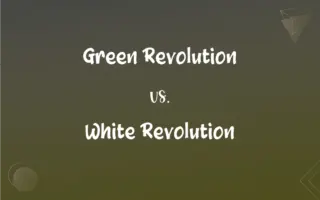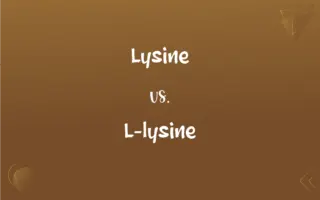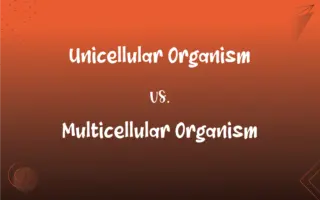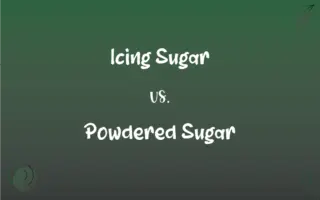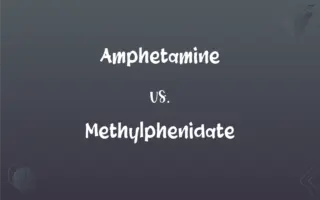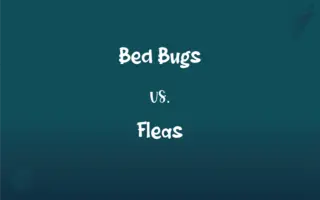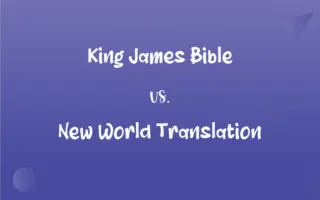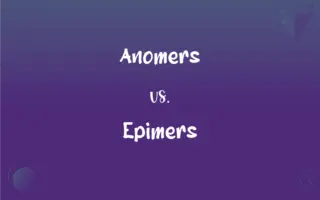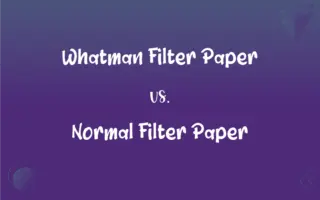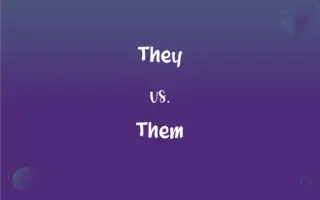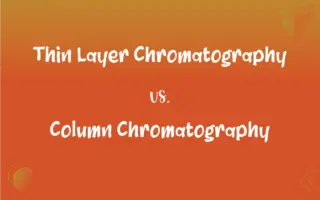Nouns vs. Verbs: What's the Difference?
Edited by Aimie Carlson || By Janet White || Published on February 23, 2024
Nouns are words that name people, places, things, or ideas, while verbs are words that describe actions, states, or occurrences.
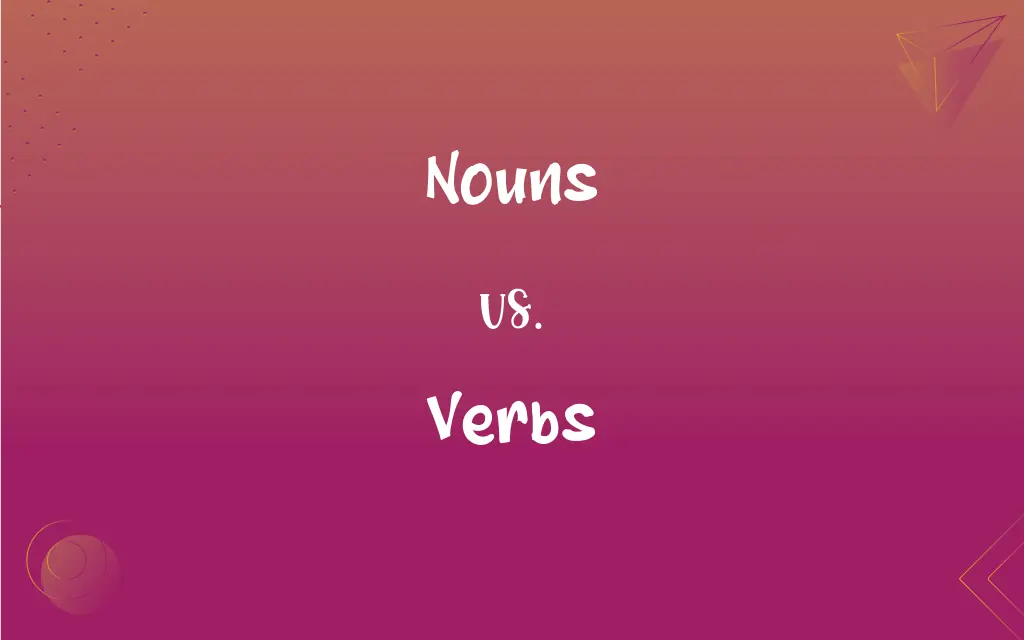
Key Differences
Nouns serve as the names of people, places, things, or ideas. They act as subjects or objects in sentences. Verbs, in contrast, describe actions, states, or occurrences and form the heart of the predicate in a sentence.
Nouns come in various types, including proper nouns, common nouns, concrete nouns, and abstract nouns. Verbs also have types, such as action verbs, linking verbs, and auxiliary verbs, each serving a different function in the sentence.
Nouns can be singular or plural and can possess other nouns, shown through possessive forms. Verbs change form to indicate tense, mood, and voice, and must agree in number and person with the subject of the sentence.
Nouns are key in identifying the subjects and objects of actions and states, giving sentences a clear focus. Verbs convey the action or state of being, providing dynamic quality and movement to the sentence.
Nouns are often modified by adjectives, which describe them, and can be complemented by phrases providing additional information. Verbs are modified by adverbs and can be complemented by objects or predicate adjectives/nouns, completing their meaning.
ADVERTISEMENT
Comparison Chart
Function
Name people, places, things, ideas
Describe actions, states, occurrences
Types
Proper, common, concrete, abstract
Action, linking, auxiliary
Grammatical Rules
Singular/plural, possessive forms
Tense, mood, voice, subject-verb agreement
Role in Sentence
Subject or object
Form the predicate
Modifiers
Modified by adjectives
Modified by adverbs
ADVERTISEMENT
Nouns and Verbs Definitions
Nouns
Nouns can exist in singular or plural forms.
The books are on the table.
Verbs
Verbs can indicate states of being.
He is a teacher.
Nouns
Nouns are words that identify people, places, or things.
The dog barked loudly.
Verbs
Verbs are words that express actions.
She runs every morning.
Nouns
Nouns can possess other nouns.
Sarah's cat is adorable.
Verbs
Verbs can be linking, connecting subject to complement.
She seems happy.
Nouns
Nouns can represent abstract concepts or ideas.
Love knows no boundaries.
Verbs
Verbs change form to express tense.
They danced all night.
Nouns
Nouns can be proper, naming specific entities.
London is a bustling city.
Verbs
Verbs require agreement with their subjects.
The cat drinks milk.
Nouns
The part of speech that is used to name a person, place, thing, quality, or action and can function as the subject or object of a verb, the object of a preposition, or an appositive.
Verbs
The part of speech that expresses existence, action, or occurrence in most languages.
Nouns
Any of the words belonging to this part of speech, such as neighbor, window, happiness, or negotiation.
Verbs
Any of the words belonging to this part of speech, as be, run, or conceive.
Nouns
Plural of noun
Verbs
A phrase or other construction used as a verb.
Nouns
Infl of noun
Verbs
Plural of verb
Verbs
Infl of verb
FAQs
Can a word be both a noun and a verb?
Yes, some words can function as both nouns and verbs, depending on usage.
What is a verb?
A verb is a word that describes an action, state, or occurrence.
What are examples of verbs?
Examples include 'run', 'is', 'laugh', 'think'.
How do possessive nouns work?
Possessive nouns show ownership, typically by adding an apostrophe and 's'.
What are examples of nouns?
Examples include 'dog', 'city', 'happiness', 'car'.
What is a collective noun?
A collective noun names a group of people or things, like 'team'.
What is a noun?
A noun is a word that names a person, place, thing, or idea.
How do nouns change form?
Nouns change form to show plurality, possession, and sometimes gender.
How do verbs change form?
Verbs change form to indicate tense, mood, and agreement with the subject.
Are proper nouns capitalized?
Yes, proper nouns are always capitalized.
Are action verbs always physical actions?
No, action verbs can also describe mental actions, like 'think'.
How is a verb used in a sentence?
A verb is typically used as the predicate, showing the action or state of the subject.
What is a noun phrase?
A noun phrase consists of a noun and its modifiers, providing more information.
Do verbs show time?
Yes, verbs change form to show past, present, and future time.
How is a noun used in a sentence?
Nouns can be subjects, objects, or complements in a sentence.
What is an abstract noun?
An abstract noun represents an idea, quality, or state, like 'freedom'.
What are modal verbs?
Modal verbs, like 'can' or 'must', express necessity, ability, or possibility.
Do all sentences need a verb?
Yes, a verb is essential in a sentence to express the action or state.
What is a linking verb?
A linking verb connects the subject to a subject complement.
Can verbs be irregular?
Yes, irregular verbs do not follow standard rules of tense changes.
About Author
Written by
Janet WhiteJanet White has been an esteemed writer and blogger for Difference Wiki. Holding a Master's degree in Science and Medical Journalism from the prestigious Boston University, she has consistently demonstrated her expertise and passion for her field. When she's not immersed in her work, Janet relishes her time exercising, delving into a good book, and cherishing moments with friends and family.
Edited by
Aimie CarlsonAimie Carlson, holding a master's degree in English literature, is a fervent English language enthusiast. She lends her writing talents to Difference Wiki, a prominent website that specializes in comparisons, offering readers insightful analyses that both captivate and inform.
